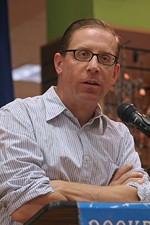News Fit to Censor
Observer Among Media That Went After Real News
By Lee Nichols, Fri., May 30, 1997
|
|
Project Censored is a media watchdog vehicle started in 1976 by Dr. Carl Jensen of Sonoma State University. Now under the directorship of Dr. Peter Phillips, the project has long been a fine source for the American public to find out what the corporate-owned mainstream media is not telling us. Corporate pollution, government corruption, consumers getting screwed -- these are the things being left out of the news in favor of articles on the British royal family or O.J. Simpson. Every year about this time, Project Censored prints its yearbook highlighting these stories and telling us where we can read about them, as well as pointing a finger at who stands to gain from media under-coverage of them. They also caustically berate the news media for suddenly "discovering" stories that the alternative press covered years ago (a little cocaine with that Contra, ma'am?), list the top 10 "junk food stories" of the year, and provide resources that can allow individuals to free themselves from dependency on news sources owned by monolithic media conglomerates.
The Observer's two stories in the book -- which, by the way, has a forward from former Observer editor Jim Hightower -- were the #2-rated "Shell's Oil, Africa's Blood," by Ron Nixon and Associate Editor Michael King, and #18-rated "Choose Your Poison" along with the follow-up, "Poisoned Welcome," also by King. The top five stories, including "Shell's Oil," are reprinted in full.
The Shell Oil story pokes holes in the company's stance as an innocent bystander in Nigeria's bloody politics, and reveals that, in fact, Shell has strong links to the African nation's totalitarian regime; the "Poison" stories expose how the Environmental Protection Agency has repealed a 16-year ban on the importation of polychlorinated biphenyls (PCBs), despite the fact that production and use of the highly toxic carcinogens in the U.S. were phased out years ago.
Another Texas media source cited -- and a rare instance of a mainstream source picking up such a crucial story -- was The Houston Chronicle for Michael Hudson's "Bordering on Scandal: What Some Pay for Credit." This piece examined how Wall Street giants such as American Express, Ford, and NationsBank deny credit to millions of poor people, thus sending them to high-interest pawnbrokers and finance companies -- businesses which are often owned by those very same giants.
I can't possibly recommend Censored more highly -- if you want to develop an ability to analyze the news and find more reliable sources of information than the likes of, say, General Electric (owners of NBC, as well as a major player in the nuclear energy industry), Westinghouse (owner of CBS, and also a nuclear energy heavyweight), or Cox Enterprises (owner of the Austin American-Statesman and a zillion other media sources), it is an invaluable tool.
My Paper, My Editor
Updating an earlier story, Texas Student Publications (TSP) -- the body which oversees The Daily Texan, the University of Texas student newspaper -- has reversed an earlier decision and returned final authority over the editorial content of the paper to the student-elected editor, rather than giving it to the TSP-appointed managing editor.
I applaud this decision. The student-elected editor is almost unheard of in the world of school newspapers -- and that uniqueness is a strength. Sometimes the process of electing editors has produced loose cannons and been problematic, but the student staffers have recently taken it upon themselves to establish a system of checks to ensure that power-mad types don't ruin the paper. And most of the time, it has produced competent and sometimes outstanding editors. More importantly, it produces editors who are answerable not to a board of directors, but to the readers. It's probably the last time in their journalistic careers that these students will get the chance to operate under those idyllic circumstances, and is worth keeping.
What Election?
More cutting-edge news coverage from our local television stations: Monday night, after Ronney Reynolds dropped out of the mayor's race and Kirk Watson was installed as our city's leader, more than one newscast ran segments literally asking the question, "Who is Kirk Watson?"
Two days after the election is a bit late to be asking this question, isn't it? Perhaps the broadcast time expended on things like K-EYE's five-part series on "Magic Tricks Revealed" (see "Media Clips," May 2) or "Austin Dream Homes" could have been better spent informing us about candidates' positions on issues, where they get their campaign contributions, their prior histories in the political arena, et cetera.
No wonder we so often feel that our city councilmembers and other elected officials break their promises and stab us in the back -- we probably didn't realize whom we had elected.
There's a runoff election on May 31. That gives the stations a few more days to provide us with the information we'll need to make an informed decision in picking our city councilmembers. Don't hold your breath waiting for them to deliver.
Killer Coverage
Is it just me, or was the coverage of the kidnapping of Dylan Michael Miller and the subsequent suicide of his kidnapper/father Kevin Ronald Miller just completely over the top?
No, I'm not a cold-hearted monster -- I'm glad the child is okay, I feel terrible for his family, and I'm horrified by the whole affair. And some coverage of the story was certainly appropriate -- a suspected killer/kidnapper was on the loose.
But was it really necessary to continually stick television cameras into the face of the poor grandfather, Michael Kennedy, and put his tragedy on display for the whole world? Was it really necessary to send news crews for live reports as the boy's plane touched down at Mueller airport? I'm not sure which traumatized the kid worse -- seeing his father kill himself or having a million camera lights flashing in his face.
This type of sensationalism is just what news consumers don't need -- squandering excessive resources on isolated incidences of crime and tug-at-your-heartstrings tragedies while information that is truly crucial to the lives of a broader range of Central Texans goes un- or under-reported. God only knows what kind of feeding frenzy local media would be in right now if JonBenet Ramsey had been killed here instead of Colorado.
My sympathies go out to Michael Kennedy and his family -- I hope the press will now leave them alone and let them try to rebuild their shattered lives in peace.
Got something to say on the subject? Send a letter to the editor.









